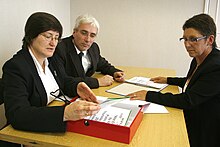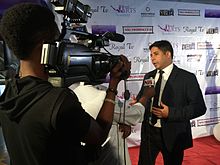Interview

A musician interviewed in a radio studio

A woman interviewing for a job

Athletes interviewed after a race

Some interviews are recorded for television broadcast

Modern videoconferencing such as Skype over the Internet allows an interview coach to assist a young woman before a hypothetical college interview despite the distance.
An interview is a conversation where questions are asked and answers are given.[1] In common parlance, the word "interview" refers to a one-on-one conversation between an interviewer and an interviewee. The interviewer asks questions to which the interviewee responds, usually so information may be transferred from interviewee to interviewer (and any other audience of the interview). Sometimes, information can be transferred in both directions. communication, unlike a speech, which produces a one-way flow of information.
Interviews usually take place face to face and in person, although modern communications technologies such as the Internet have enabled conversations to happen in which parties are separated geographically, such as with videoconferencing software,[2] and telephone interviews can happen without visual contact. Interviews almost always involve spoken conversation between two or more parties, although in some instances a "conversation" can happen between two persons who type questions and answers back and forth. Interviews can range from unstructured or free-wheeling and open-ended conversations in which there is no predetermined plan with prearranged questions,[3] to highly structured conversations in which specific questions occur in a specified order.[4] They can follow diverse formats; for example, in a ladder interview, a respondent's answers typically guide subsequent interviews, with the object being to explore a respondent's subconscious motives.[5][6] Typically the interviewer has some way of recording the information that is gleaned from the interviewee, often by writing with a pencil and paper, sometimes transcribing with a video or audio recorder, depending on the context and extent of information and the length of the interview. Interviews have a duration in time, in the sense that the interview has a beginning and an ending.
The traditional two-person interview format, sometimes called a one-on-one interview, permits direct questions and followups, which enables an interviewer to better gauge the accuracy of responses. It is a flexible arrangement in the sense that subsequent questions can be tailored to clarify earlier answers. Further, it eliminates any possible distortion by having third parties present.
Face to face interviewing makes it easier for people to interact and form a connection, and it helps both the potential employer and potential hire who they might be interacting with.[7] Further, face to face interview sessions can be more enjoyable.[7]
Contexts
Interviews can happen in a wide variety of contexts:
Employment. Interviews in an employment context are typically called job interviews which describe a formal consultation for the purpose of evaluating the qualifications of the interviewee for a specific position.[8] Interviews are seen as a useful tool in assessing qualifications.[9] A specific type of job interview is a case interview in which the applicant is presented with a question or task or challenge, and asked to resolve the situation.[10] Sometimes to prepare for job interviews, candidates are treated to a mock interview as a training exercise to prepare the respondent to handle questions in the subsequent 'real' interview. Sometimes the interviews happen in several waves, with the first interview sometimes being called a screening interview which is a shorter length interview, followed by more in-depth interviews later on, usually by company personnel who can ultimately hire the applicant. Technology has enabled new possibilities for interviewing; for example, video phoning technology has enabled applicants to interview for jobs despite being in different cities or countries than the interviewer.
Psychology. Psychologists use a variety of interviewing methods and techniques to try to understand and help their patients. In a psychiatric interview, a psychiatrist or psychologist or nurse asks a battery of questions to complete what is called a psychiatric assessment. Sometimes two people are interviewed by an interviewer, with one format being called couple interviews.[11] Criminologists and detectives sometimes use cognitive interviews on eyewitnesses and victims to try to ascertain what can be recalled specifically from a crime scene, hopefully before the specific memories begin to fade in the mind.[12][13]
Research. In marketing research and academic research, interviews are used in a wide variety of ways. Interviews are often used in qualitative research in which firms try to understand how consumers think. Consumer research firms sometimes use computer-assisted telephone interviewing to randomly dial phone numbers to conduct highly structured telephone interviews, with scripted questions and responses entered directly into the computer.[14]
Journalism and other media. Typically, reporters covering a story in journalism conduct interviews over the phone and in person to gain information for subsequent publication. Reporters can interview political candidates on television shows. In a talk show, a radio or television "host" interviews one or more people, with the choice of topic usually being chosen by the host, sometimes for the purposes of entertainment, sometimes for informational purposes. Such interviews are often recorded and some of them can be released on an interview disc.
Other situations. Sometimes college representatives or alumni conduct college interviews with prospective students as a way of assessing a student's suitability while offering the student a chance to learn more about a college.[15] Some services specialize in coaching people for interviews.[15] Embassy officials may conduct interviews with applicants for student visas before approving their visa applications.
See also
Repertory grid interview
- In research
- Telephone interview
- Computer assisted telephone interviewing
- Interview (research)
- Knowledge transfer
- Online interview
Mall intercept interview
Qualitative research interview- Structured interview
- Unstructured interview
- In journalism and media
- Interview (journalism)
- Talk show
- In other contexts
- College interview
Reference interview, between a librarian and a library user
References
^ Merriam Webster Dictionary, Interview, Dictionary definition, Retrieved February 16, 2016
^ "Introduction to Interviewing". Brandeis University. Retrieved 2015-05-02..mw-parser-output cite.citation{font-style:inherit}.mw-parser-output .citation q{quotes:"""""""'""'"}.mw-parser-output .citation .cs1-lock-free a{background:url("//upload.wikimedia.org/wikipedia/commons/thumb/6/65/Lock-green.svg/9px-Lock-green.svg.png")no-repeat;background-position:right .1em center}.mw-parser-output .citation .cs1-lock-limited a,.mw-parser-output .citation .cs1-lock-registration a{background:url("//upload.wikimedia.org/wikipedia/commons/thumb/d/d6/Lock-gray-alt-2.svg/9px-Lock-gray-alt-2.svg.png")no-repeat;background-position:right .1em center}.mw-parser-output .citation .cs1-lock-subscription a{background:url("//upload.wikimedia.org/wikipedia/commons/thumb/a/aa/Lock-red-alt-2.svg/9px-Lock-red-alt-2.svg.png")no-repeat;background-position:right .1em center}.mw-parser-output .cs1-subscription,.mw-parser-output .cs1-registration{color:#555}.mw-parser-output .cs1-subscription span,.mw-parser-output .cs1-registration span{border-bottom:1px dotted;cursor:help}.mw-parser-output .cs1-ws-icon a{background:url("//upload.wikimedia.org/wikipedia/commons/thumb/4/4c/Wikisource-logo.svg/12px-Wikisource-logo.svg.png")no-repeat;background-position:right .1em center}.mw-parser-output code.cs1-code{color:inherit;background:inherit;border:inherit;padding:inherit}.mw-parser-output .cs1-hidden-error{display:none;font-size:100%}.mw-parser-output .cs1-visible-error{font-size:100%}.mw-parser-output .cs1-maint{display:none;color:#33aa33;margin-left:0.3em}.mw-parser-output .cs1-subscription,.mw-parser-output .cs1-registration,.mw-parser-output .cs1-format{font-size:95%}.mw-parser-output .cs1-kern-left,.mw-parser-output .cs1-kern-wl-left{padding-left:0.2em}.mw-parser-output .cs1-kern-right,.mw-parser-output .cs1-kern-wl-right{padding-right:0.2em}
^ Rogers, Carl R. (1945). Frontier Thinking in Guidance. University of California: Science research associates. pp. 105–112. Retrieved March 18, 2015.
^ Kvale & Brinkman. 2008. InterViews, 2nd Edition. Thousand Oaks: SAGE.
ISBN 978-0-7619-2542-2
^ 2009, Uxmatters, Laddering: A research interview technique for uncovering core values
^ "15 Tips on How to Nail a Face-to-Face Interview". blog.pluralsight.com. Retrieved 2015-11-05.
^ ab Snap Surveys, Advantages and disadvantages of face to face data collection, Retrieved April 27, 2018
^ Dipboye, R. L., Macan, T., & Shahani-Denning, C. (2012). The selection interview from the interviewer and applicant perspectives: Can't have one without the other. In N. Schmitt (Ed.), The Oxford handbook of personnel assessment and selection (pp. 323-352). New York City: Oxford University.
^ "The Value or Importance of a Job Interview". Houston Chronicle. Retrieved 2014-01-17.
^ Maggie Lu, The Harvard Business School Guide to Careers in Management Consulting, 2002, page 21,
ISBN 978-1-57851-581-3
^ Polak, L; Green, J (2015). "Using Joint Interviews to Add Analytic Value". Qualitative Health Research. 26 (12): 1638–48. doi:10.1177/1049732315580103. PMID 25850721.
^ Memon, A., Cronin, O., Eaves, R., Bull, R. (1995). An empirical test of mnemonic components of the cognitive interview. In G. Davies, S. Lloyd-Bostock, M. McMurran, C. Wilson (Eds.), Psychology, Law, and Criminal Justice (pp. 135-145). Berlin: Walter de Gruyer.
^ Rand Corporation. (1975) The criminal investigation process (Vol. 1-3). Rand Corporation Technical Report R-1776-DOJ, R-1777-DOJ, Santa Monica, CA
^ "BLS Information". Glossary. U.S. Bureau of Labor Statistics Division of Information Services. February 28, 2008. Retrieved 2009-05-05.
^ ab Sanjay Salomon (January 30, 2015). "Can a Failure Resume Help You Succeed?". Boston Globe. Retrieved January 31, 2016....A 'failure resume' is ... a private exercise ... outline what they learned from the experience ... Mark Efinger is president and founder of Interview Skill Coaching Academy in Great Barrington, where he prepares candidates for the job interview experience. ...